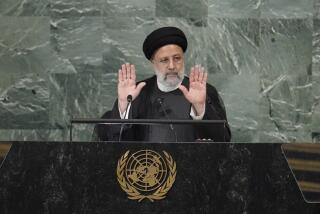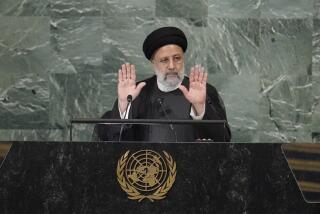Ahmadinejad lowers the volume
- Share via
TEHRAN — In his first formal news conference since a U.S. intelligence report last week undercut claims that Iran was secretly developing nuclear weapons, President Mahmoud Ahmadinejad struck an unusually mild tone Tuesday, calling for dialogue with Washington and forgoing his usual anti-American and anti-Israeli rhetoric.
He also denied that Iran had resumed a secret nuclear weapons program, a claim made by an Iranian exile group, the Mujahedin Khalq, which has been listed as a terrorist organization by the U.S. State Department and the European Union. The group cited unidentified sources in Iran as saying the Islamic Republic had restarted its program in 2004.
A U.S. National Intelligence Estimate released last week concludes that Iran halted its weapons program in 2003. Tehran denies ever having such a program.
Ahmadinejad initially gloated over the report as vindication for Iran, though it says his country continued to enrich uranium and that Iran easily could restart its weapons program. But at the two-hour news conference, Ahmadinejad described the report as “a positive and forward step” by the U.S. to ease tensions in the Middle East.
“We do hope there will be one or two steps forward so as to make a different atmosphere for finding solutions,” he told reporters. “If further steps are taken, then our problems will be less complicated.”
Despite the softened tone, Ahmadinejad said Iran would continue its uranium enrichment program in defiance of international standards. He predicted Iran would have the ability to run 50,000 high-speed centrifuges within five years. Iran has about 3,000 centrifuges, which if run continuously for a year could in theory produce enough highly enriched uranium for one nuclear bomb, though inspectors have not detected high levels of enrichment at Iran’s facility in Natanz.
Many officials in Iran viewed the U.S. report as an olive branch, and some analysts have urged the Iranian leadership to take the opportunity to enhance ties or at least reopen channels of communication between Tehran and Washington. The two nations have had a hostile relationship since the 1979 revolution in Iran.
U.S. and Iranian officials are scheduled to meet in Baghdad on Dec. 18 for the fourth round of talks over securing Iraq. Such meetings have usually been preceded by chest-thumping and accusations on both sides. But at Tuesday’s news conference, his eighth since taking office in 2005, Ahmadinejad expressed confidence that the meetings would eventually produce positive results for bolstering security in Iraq.
Regardless of what the U.S. report concludes, Iran still faces the prospect of a third round of international sanctions over its enrichment of uranium. A team of International Atomic Energy Agency experts arrived in Tehran on Sunday in an attempt to clear up lingering questions over the country’s nuclear program. Iran insists its goal is to generate electricity, but the West suspects the effort is a cornerstone for an eventual weapons program.
Iran’s nuclear program and political and material support for armed groups fighting Israel have brought Tehran under heightened international scrutiny. Ahmadinejad and his circle also have come under enormous pressure from multiple quarters within Iran’s fractured political class.
On Monday, influential lawmaker Ahmad Tavakoli criticized Ahmadinejad for gloating over the U.S. report, which Tavakoli said contains many allegations that cast Iran in a negative light.
“By expressing happiness we may increase the credibility of these kinds of reports,” said Tavakoli, a former ally of Ahmadinejad. “In the future, they may release some reports which will have more credibility and are against the Islamic Republic of Iran.”
Former President Mohammad Khatami, who tried unsuccessfully to liberalize Iran’s Islamic system, told students at Chamran University on Tuesday that people should not be “Islamicized by force,” a criticism of Ahmadinejad’s hard-line social policies.
Witnesses said students chanted, “Death to despotism!” Hundreds of students demonstrating at Tehran University on Sunday burst through the campus gates, chanting, “Ahmadi-Pinochet, Iran will not be Chile!” before they were dispersed by riot police.
Rival conservative, moderate and reformist Iranian political factions see Ahmadinejad and his loyalists as vulnerable in upcoming March parliamentary elections, primarily because of his administration’s failure to curb inflation, create jobs or draw foreign investment.
Although he confidently answered questions about Iran’s nuclear program, the security situation in Iraq and his country’s opposition to Israel, Ahmadinejad brushed aside a question about the reason for recent increases in the price of dairy products and other foods.
“In the near future,” he said, “I will explain it in a press conference to the people.”
Mostaghim is a special correspondent and Daragahi a Times staff writer.
More to Read
Sign up for Essential California
The most important California stories and recommendations in your inbox every morning.
You may occasionally receive promotional content from the Los Angeles Times.










